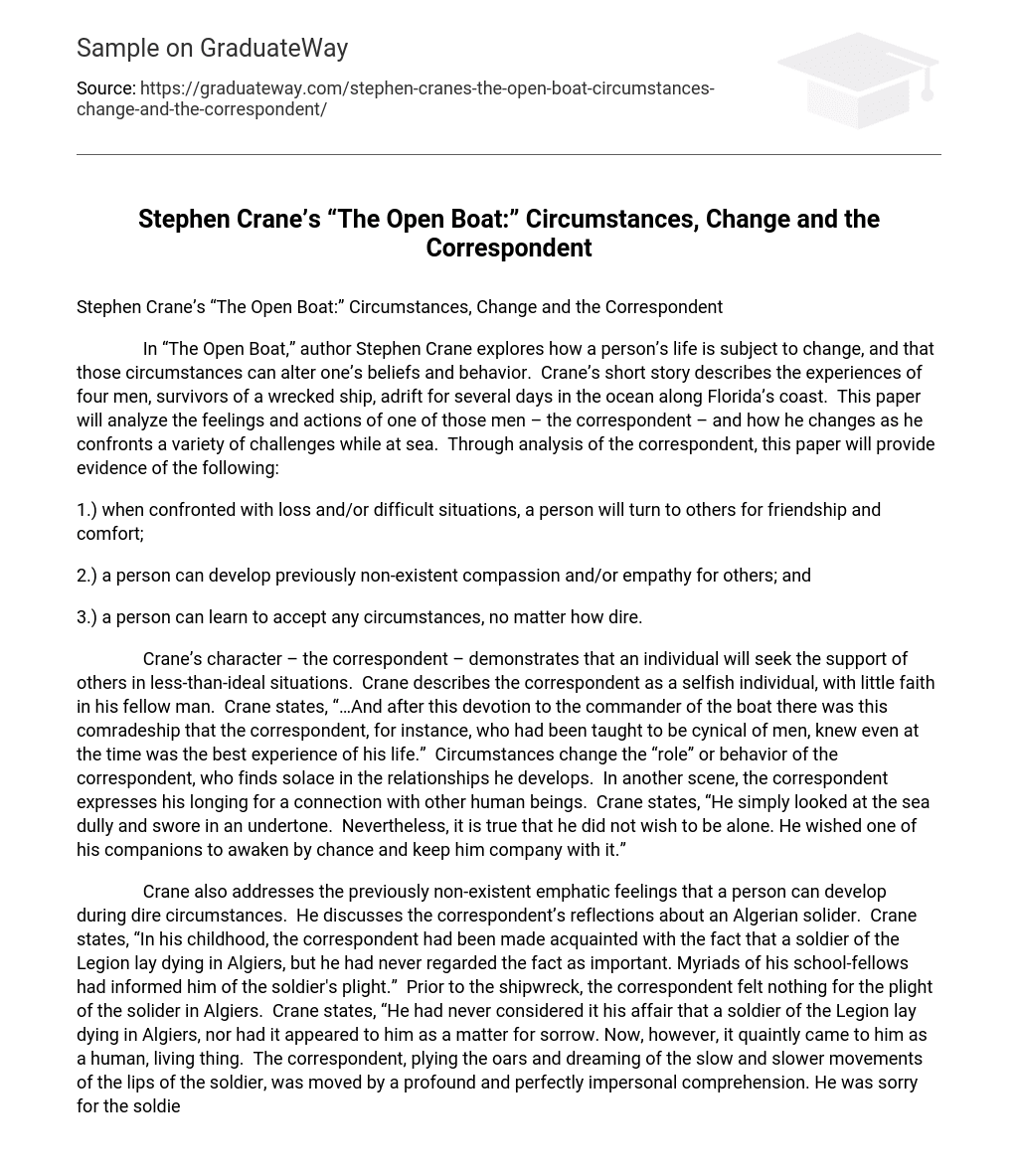In “The Open Boat,” author Stephen Crane explores how a person’s life is subject to change, and that those circumstances can alter one’s beliefs and behavior. Crane’s short story describes the experiences of four men, survivors of a wrecked ship, adrift for several days in the ocean along Florida’s coast. This paper will analyze the feelings and actions of one of those men – the correspondent – and how he changes as he confronts a variety of challenges while at sea. Through analysis of the correspondent, this paper will provide evidence of the following:
1.) when confronted with loss and/or difficult situations, a person will turn to others for friendship and comfort;
2.) a person can develop previously non-existent compassion and/or empathy for others; and
3.) a person can learn to accept any circumstances, no matter how dire.
Crane’s character – the correspondent – demonstrates that an individual will seek the support of others in less-than-ideal situations. Crane describes the correspondent as a selfish individual, with little faith in his fellow man. Crane states, “…And after this devotion to the commander of the boat there was this comradeship that the correspondent, for instance, who had been taught to be cynical of men, knew even at the time was the best experience of his life.” Circumstances change the “role” or behavior of the correspondent, who finds solace in the relationships he develops. In another scene, the correspondent expresses his longing for a connection with other human beings. Crane states, “He simply looked at the sea dully and swore in an undertone. Nevertheless, it is true that he did not wish to be alone. He wished one of his companions to awaken by chance and keep him company with it.”
Crane also addresses the previously non-existent emphatic feelings that a person can develop during dire circumstances. He discusses the correspondent’s reflections about an Algerian solider. Crane states, “In his childhood, the correspondent had been made acquainted with the fact that a soldier of the Legion lay dying in Algiers, but he had never regarded the fact as important. Myriads of his school-fellows had informed him of the soldier’s plight.” Prior to the shipwreck, the correspondent felt nothing for the plight of the solider in Algiers. Crane states, “He had never considered it his affair that a soldier of the Legion lay dying in Algiers, nor had it appeared to him as a matter for sorrow. Now, however, it quaintly came to him as a human, living thing. The correspondent, plying the oars and dreaming of the slow and slower movements of the lips of the soldier, was moved by a profound and perfectly impersonal comprehension. He was sorry for the soldier of the Legion who lay dying in Algiers.” Thus, as the correspondent suffers through his plight at sea, he finds value in the life and situation of the Algerian soldier of his childhood. He develops compassion for others.
Crane also addresses man’s ability to accept his fate. He discusses the correspondent’s changing attitude regarding the possibility of rescue. The correspondent is, at first, puts forth great effort to make it to shore. For example, Crane states, “The plan of the oiler and the correspondent was for one to row until he lost the ability, and then arouse the other from his sea-water couch in the bottom of the boat.” Later, the correspondent stoically accepts any possible outcome of the shipwreck. Crane describes the correspondent’s thoughts as the four men attempted to make it to shore. He states, “…Observing the others, knew that they were not afraid…As for himself, he was too tired to grapple fundamentally with the fact. He tried to coerce his mind into thinking of it, but the mind was dominated at this time by the muscles, and the muscles said they did not care. It merely occurred to him that if he should drown it would be a shame. There were no hurried words, no pallor, no plain agitation.”
In conclusion, a situation as challenging as surviving a shipwreck, only to wind up adrift in the ocean for days, can alter a person’s attitude toward life. Because one is confronted with great loss, the person often develops a greater appreciation for life and for others. Changed circumstances lead to changes in behavior – and a person learns to value friendship, develop compassion for his fellow man and accept life as it comes.
References
Crane, Stephen. “The Open Boat.” Scribner’s Magazine 21. New York:
Charles Scribner’s Sons, 1894. 728-740.
;





